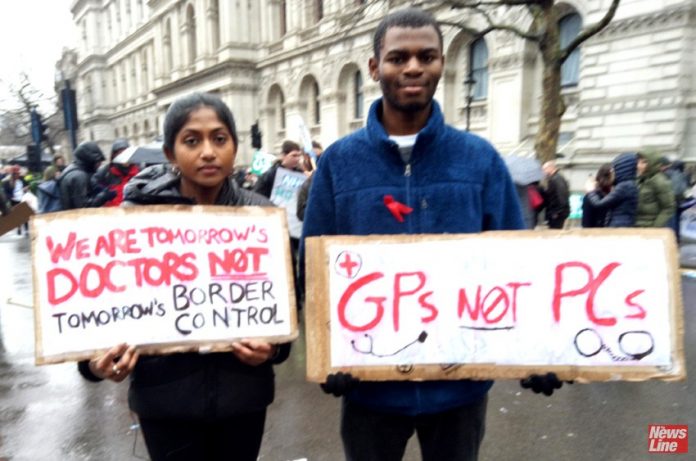PATIENTS from other countries are failing to get the urgent cancer treatment they need, because of upfront fees. These fees are ‘deterring immigrants from seeking NHS care’
On March 29, EU ‘leaving day,’ workers demonstrated in London showing their disgust at May’s parliamentary betrayal.
The BMA says charging regulations for overseas patients are threatening the quality of NHS care. The BMA is calling for the upfront fees to be scrapped.
In one case, a 60-year-old patient was told just before an operation that it would cost her £6,000.
The government had attempted to force doctors to act like border guards and demand patients produce ID to prove their immigration status. This is something that doctors refused to do, forcing the government to retract their reactionary policy.
The report published yesterday by the British Medical Association said that even pregnant women were going without antenatal and postnatal care for fear of being charged.
The call comes as frontline doctors describe their first-hand experience of the detrimental effects of the regulations.
Under 2015 regulations, NHS bodies were given new powers to charge overseas visitors not eligible for free treatment.
First-hand testimonies from doctors also revealed the kind of problems the regulations are causing for vulnerable patients and the staff treating them on the frontline:
‘Patient (English born, 60 years old, lived abroad outside EU for 20 years) told immediately before an operation it would cost her £6,000. No interaction with clinical staff regarding immediacy. Patient left distraught being wheeled down for operation.’
‘I have had a few patients tell me, they delayed coming to A&E for an acute problem as they thought they would be charged.’
‘In my area women have not accessed antenatal care, present to hospital in labour, then do not access postnatal care nor care for infants.’
‘I had a patient who did not seek help for a rare eye cancer as she was ineligible for NHS treatment. She died in her 40s as a result of this.’
‘People won’t access health services until too late; example in HIV … where we’re trying to reduce “late diagnoses”… The two policies are not compatible together … ’
‘Chronic conditions may be under treated if care is only sought when deemed worth paying for by vulnerable groups – either because of financial situations or concerns about the impact on seeking treatment on other aspects of life including residential status.’
Dr John Chisholm, BMA medical ethics committee chair, said: ‘The role of doctors – and all of their healthcare colleagues – must be to treat and care for patients, not to act as border guards, policing patients’ access to and payment for treatment.
‘Crucially, urgent treatment must be prioritised over administrative process and safeguards must be put in place to protect vulnerable groups and ensure that patients are not deterred from seeking care.
‘This is particularly important to mitigate risk to the individual patient, to avoid their health worsening considerably, but also to protect the wider public’s health, as infectious conditions can spread quickly if not treated at the earliest possible stage.’
